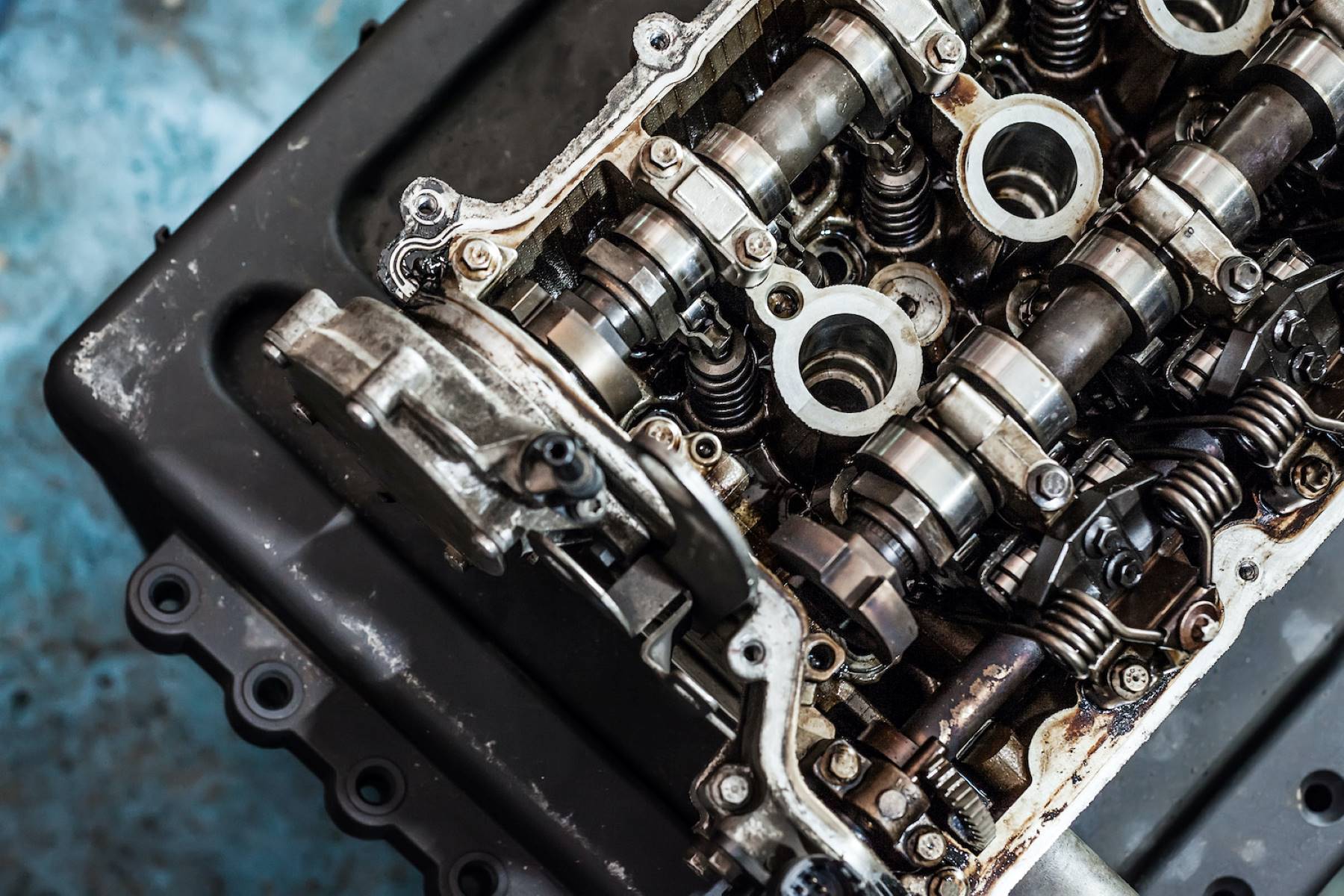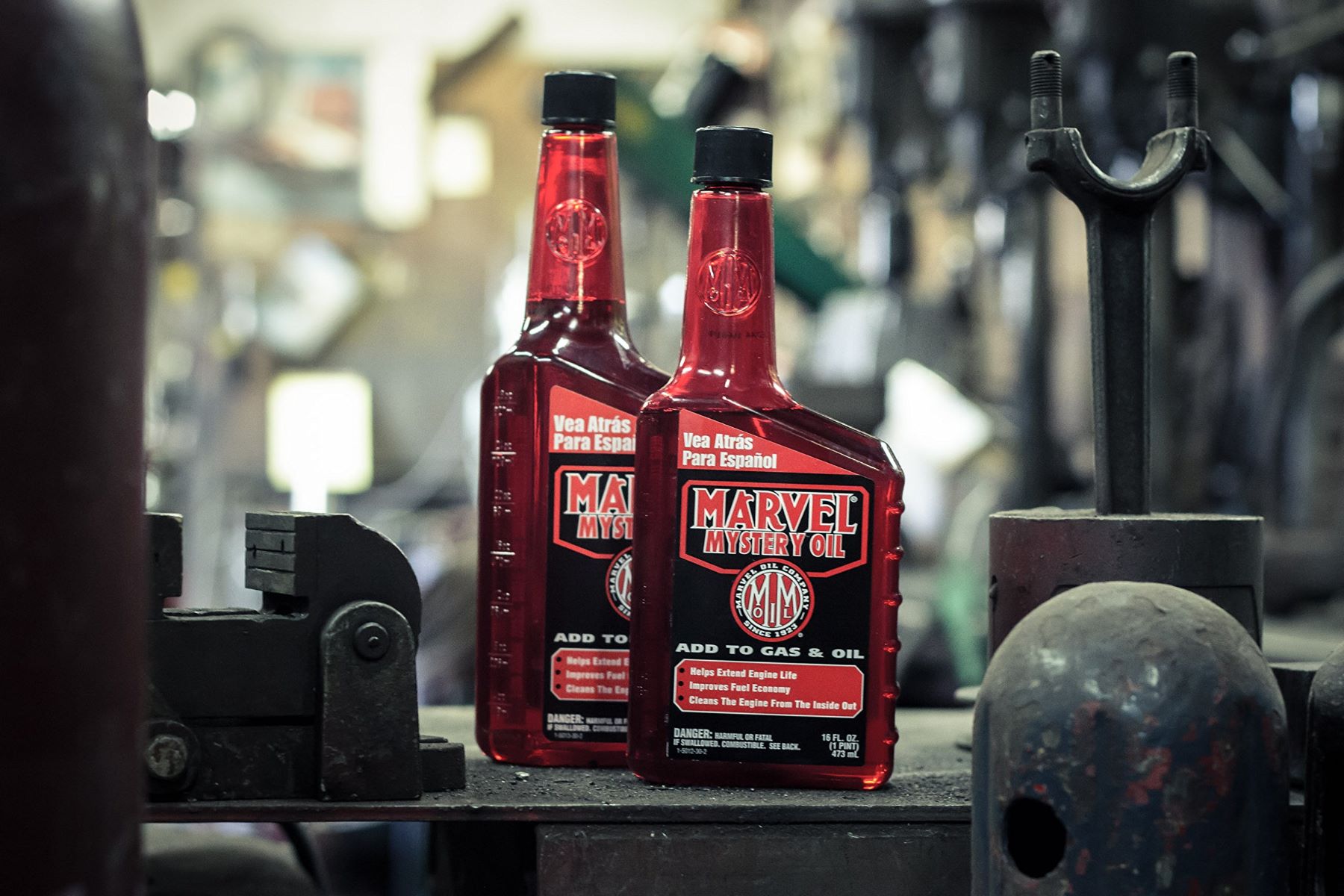Home>Automotive>The Surprising Link Between Bad Oil And Cylinder Misfires


Automotive
The Surprising Link Between Bad Oil And Cylinder Misfires
Published: January 14, 2024
Discover the surprising connection between low-quality oil and engine misfires in automotive vehicles. Learn how to prevent cylinder misfires with the right oil.
(Many of the links in this article redirect to a specific reviewed product. Your purchase of these products through affiliate links helps to generate commission for Regretless.com, at no extra cost. Learn more)
Table of Contents
Introduction
Engines are the beating heart of every vehicle, propelling us forward with power and precision. However, even the most finely-tuned engines can experience hiccups, and one of the most common issues is cylinder misfires. A cylinder misfire occurs when the fuel-air mixture in a combustion chamber fails to ignite at the right time, causing a disruption in the engine's smooth operation. This can lead to a range of problems, from decreased fuel efficiency to potential damage to the catalytic converter.
What may surprise many drivers is the significant impact that engine oil can have on cylinder misfires. Engine oil is often associated with lubricating moving parts and reducing friction, but its role in preventing misfires is lesser known. The quality and condition of the engine oil can directly influence the performance and longevity of the engine, including its ability to maintain smooth and efficient combustion in the cylinders.
In this article, we will delve into the surprising link between bad oil and cylinder misfires, shedding light on how the quality of engine oil can affect the overall health and performance of a vehicle. Understanding this connection is crucial for drivers and auto enthusiasts alike, as it can empower them to make informed decisions about oil maintenance and selection, ultimately contributing to a smoother and more reliable driving experience. Let's explore the intricate relationship between engine oil and cylinder misfires, uncovering the pivotal role that good oil plays in keeping engines firing on all cylinders.
Understanding Cylinder Misfires
Cylinder misfires are like a disruptive hiccup in the otherwise smooth rhythm of an engine's operation. Each cylinder in an engine is responsible for igniting a precise mixture of fuel and air at the right moment to generate power. When this process is interrupted, it results in a cylinder misfire. This can be caused by a variety of factors, including issues with the ignition system, fuel delivery, or the combustion process itself.
A misfire can be identified by the vehicle's onboard diagnostics system, often triggering the dreaded check engine light. When this occurs, it's essential to address the issue promptly to prevent potential damage to the engine and its components. Ignoring cylinder misfires can lead to increased exhaust emissions, reduced fuel efficiency, and even permanent damage to the catalytic converter.
The consequences of cylinder misfires extend beyond mere inconvenience. They can impact the overall performance and drivability of the vehicle, causing rough idling, hesitation during acceleration, and a noticeable decrease in power. Additionally, prolonged misfires can lead to increased emissions and may even result in a failed emissions test.
Understanding the underlying causes of cylinder misfires is crucial for maintaining the health and efficiency of the engine. By identifying and addressing the root issues, drivers can prevent more severe problems and ensure that their vehicles continue to operate reliably. Furthermore, recognizing the role of engine oil in this context can provide valuable insights into how proper maintenance and oil selection can contribute to minimizing the occurrence of cylinder misfires.
In the next sections, we will explore the surprising influence of engine oil on cylinder misfires, highlighting the critical role that good oil plays in promoting optimal engine performance and minimizing the risk of disruptive misfires.
The Role of Engine Oil
Engine oil is often heralded for its primary function of lubricating the moving parts within an engine, reducing friction, and dissipating heat. However, its significance extends far beyond mere lubrication. Engine oil serves as a multifaceted guardian, protecting the engine from wear and tear, corrosion, and harmful deposits while contributing to the efficiency and performance of the entire system.
Lubrication and Friction Reduction
At the core of its role, engine oil forms a protective barrier between the moving components of the engine, such as the pistons, crankshaft, and camshaft. This lubrication minimizes friction, preventing metal-to-metal contact that can lead to excessive wear and premature failure. By ensuring smooth and seamless operation, engine oil prolongs the lifespan of critical engine parts, maintaining their integrity and functionality over time.
Heat Dissipation
In addition to lubrication, engine oil plays a vital role in dissipating heat generated by the engine's internal combustion process. As the oil circulates through the engine, it absorbs and carries away heat from the hottest areas, preventing overheating and thermal degradation of components. This function is essential for preserving the structural integrity of the engine and optimizing its performance under varying operating conditions.
Corrosion Protection
Engine oil acts as a protective shield against corrosion, safeguarding metal surfaces from the damaging effects of moisture and chemical by-products of combustion. By forming a thin film over vulnerable surfaces, the oil inhibits the formation of rust and corrosion, preserving the structural integrity of engine components and preventing potential malfunctions.
Cleaning and Deposit Control
Moreover, high-quality engine oils are formulated with detergents and dispersants that help keep the engine clean by suspending and dispersing contaminants and deposits. This prevents the accumulation of sludge, varnish, and carbon deposits, which can impede the smooth operation of engine components and contribute to reduced performance and efficiency.
Seal Conditioning
Engine oil also supports the proper functioning of seals and gaskets within the engine. It helps condition and maintain the flexibility of these critical components, preventing leaks and ensuring the integrity of the engine's internal environment.
Overall System Efficiency
By fulfilling these diverse roles, engine oil contributes to the overall efficiency and longevity of the engine, directly impacting its performance, fuel economy, and longevity. The choice of high-quality oil and adherence to recommended oil change intervals are essential for preserving the engine's health and mitigating the risk of malfunctions, including cylinder misfires.
Understanding the multifaceted role of engine oil provides valuable insights into its impact on the engine's overall performance and reliability. In the following section, we will delve into the surprising link between bad oil and cylinder misfires, shedding light on how the quality of engine oil can influence the occurrence of disruptive misfires.
The Impact of Bad Oil on Cylinder Misfires
The quality and condition of engine oil play a pivotal role in the prevention of cylinder misfires. Bad oil, characterized by degradation, contamination, or inadequate lubricating properties, can significantly impact the combustion process within the engine's cylinders, leading to an increased risk of misfires. Understanding the specific ways in which bad oil influences the occurrence of misfires sheds light on the critical importance of maintaining high-quality oil in a vehicle's engine.
Lubrication Breakdown
When engine oil deteriorates due to extended use beyond its recommended service life or exposure to harsh operating conditions, its lubricating properties diminish. Inadequate lubrication within the engine can result in increased friction and wear on critical components, including the pistons, piston rings, and cylinder walls. As a consequence, the compromised lubrication provided by bad oil can lead to irregularities in the movement of these components, affecting the precision and timing of the combustion process and potentially resulting in cylinder misfires.
Increased Deposits and Contaminants
Bad oil, especially when contaminated with dirt, metal particles, or combustion by-products, can contribute to the formation of harmful deposits within the engine. These deposits can accumulate on the spark plugs, fuel injectors, and intake valves, disrupting the proper delivery and ignition of the fuel-air mixture. Additionally, the presence of deposits can interfere with the smooth movement of engine components, leading to irregular combustion and the potential for misfires.
Impaired Heat Dissipation
As bad oil loses its ability to effectively dissipate heat, the engine's internal temperature can rise to levels that compromise the efficiency of the combustion process. Elevated temperatures within the cylinders can negatively impact the air-fuel mixture, leading to incomplete combustion and the likelihood of misfires. Moreover, the diminished heat dissipation can contribute to increased wear on engine components, further exacerbating the risk of misfires.
Read more: Surprising Connection: Unveiling The Startling Link Between The KKK And The Knights Of Columbus
Seal Deterioration
Over time, bad oil can contribute to the deterioration of seals and gaskets within the engine. As these critical components lose their integrity, the potential for oil leaks and the intrusion of contaminants into the combustion chambers increases. This can disrupt the precise air-fuel mixture required for optimal combustion, potentially leading to misfires and diminished engine performance.
In summary, the impact of bad oil on cylinder misfires is multifaceted, encompassing lubrication breakdown, increased deposits, impaired heat dissipation, and seal deterioration. By recognizing these influences, drivers and vehicle owners can appreciate the critical role of high-quality, well-maintained engine oil in preventing the occurrence of disruptive misfires and preserving the overall health and performance of their vehicles.
Signs of Bad Oil and Cylinder Misfires
Identifying the signs of bad oil and cylinder misfires is crucial for maintaining the health and performance of a vehicle's engine. By recognizing these indicators, drivers can take proactive measures to address potential issues and prevent more severe complications.
Signs of Bad Oil
-
Discolored or Dirty Oil: When inspecting the engine oil on the dipstick, drivers may notice a dark or gritty appearance, indicating contamination by dirt, debris, or combustion by-products. This can diminish the oil's effectiveness and lead to increased wear on engine components.
-
Low Oil Level: A sudden drop in the oil level, as observed on the dipstick, may indicate a leak or excessive oil consumption, both of which can compromise the engine's lubrication and cooling capabilities.
-
Unusual Engine Noises: Old or contaminated oil may fail to adequately lubricate the engine, resulting in increased friction and potentially causing knocking, tapping, or rumbling noises during operation.
-
Poor Fuel Economy: Degraded oil can contribute to increased friction and reduced efficiency within the engine, leading to decreased fuel economy as the engine works harder to overcome the effects of bad oil.
-
Visible Exhaust Smoke: In some cases, bad oil can be burned within the engine, leading to the emission of blue or gray smoke from the exhaust, indicative of oil combustion and potential internal leaks.
Signs of Cylinder Misfires
-
Check Engine Light: The illumination of the check engine light, often accompanied by a diagnostic trouble code related to cylinder misfires, indicates a disruption in the combustion process that warrants immediate attention.
-
Rough Idling: A noticeable vibration or unsteady idle when the vehicle is stationary can be a sign of cylinder misfires, indicating irregular combustion within one or more cylinders.
-
Decreased Acceleration and Power: Misfires can lead to a loss of power and responsiveness, particularly during acceleration, as the engine fails to deliver consistent and efficient propulsion.
-
Increased Exhaust Emissions: Prolonged misfires can result in higher emissions, potentially leading to the detection of excessive pollutants during emissions testing.
-
Engine Vibrations: Misfires can cause the engine to shake or vibrate abnormally, indicating disruptions in the combustion process and potential irregularities within the cylinders.
By remaining vigilant for these signs of bad oil and cylinder misfires, drivers can promptly address any emerging issues to maintain the optimal performance and longevity of their vehicles. Regular oil inspections, adherence to recommended oil change intervals, and timely diagnosis of engine irregularities are essential for mitigating the impact of bad oil and minimizing the occurrence of disruptive cylinder misfires.
Preventing Cylinder Misfires with Good Oil
Preventing cylinder misfires begins with the proactive selection and maintenance of high-quality engine oil. By prioritizing the use of good oil and adhering to recommended maintenance practices, drivers can significantly reduce the likelihood of disruptive misfires and contribute to the long-term health and performance of their vehicles.
Choosing the Right Oil
Selecting the appropriate oil for a vehicle's engine is paramount to its smooth operation and longevity. It is essential to consult the manufacturer's recommendations regarding the viscosity grade and performance specifications suitable for the engine. High-quality synthetic oils, formulated to meet or exceed industry standards, offer enhanced protection against wear, deposit formation, and thermal breakdown, making them an excellent choice for preventing misfires.
Regular Oil Changes
Adhering to the prescribed oil change intervals is critical for maintaining the effectiveness of the engine oil. Over time, oil degrades due to exposure to high temperatures, contaminants, and the mechanical stresses within the engine. Regular oil changes ensure that the engine is continuously supplied with fresh, clean oil, preserving its lubricating and protective properties and minimizing the risk of misfires.
Monitoring Oil Levels and Quality
Regularly checking the oil level and condition is essential for early detection of potential issues. Maintaining the oil at the recommended level and promptly addressing any signs of contamination or degradation can prevent the onset of conditions that may lead to cylinder misfires. Additionally, utilizing high-quality oil filters during oil changes aids in preserving the oil's cleanliness and effectiveness.
Addressing Underlying Issues
In addition to using good oil, addressing underlying issues that can contribute to misfires is crucial. This includes maintaining the ignition system, fuel delivery components, and emission control systems in optimal condition. Ensuring that the engine receives a consistent and precise fuel-air mixture, along with efficient ignition, reduces the likelihood of misfires and promotes smooth engine operation.
Professional Maintenance
Engaging qualified technicians for routine maintenance and inspections can provide valuable insights into the overall health of the engine and its oil. Trained professionals can identify potential issues early on, recommend suitable oil formulations, and perform essential maintenance tasks to prevent misfires and preserve the engine's reliability.
By prioritizing the use of high-quality oil, adhering to recommended maintenance practices, and addressing potential contributing factors, drivers can proactively prevent cylinder misfires and maintain the optimal performance and longevity of their vehicles. Good oil serves as a foundational element in safeguarding the engine against the disruptive effects of misfires, contributing to a smoother and more reliable driving experience.
Conclusion
In conclusion, the relationship between engine oil and cylinder misfires unveils a remarkable connection that is often overlooked by many drivers. Engine oil, renowned for its lubricating properties, plays a multifaceted role in preserving the health and performance of an engine, with a direct impact on the occurrence of cylinder misfires. The pivotal role of good oil in preventing misfires cannot be overstated, as it serves as a critical line of defense against the disruptive effects of irregular combustion within the engine's cylinders.
By understanding the nuanced influence of engine oil on cylinder misfires, drivers and vehicle owners can make informed decisions regarding oil selection, maintenance practices, and proactive measures to mitigate the risk of misfires. The signs of bad oil and cylinder misfires provide valuable indicators for identifying potential issues and addressing them promptly, safeguarding the engine against performance disruptions and potential damage.
Choosing the right oil, adhering to recommended oil change intervals, and monitoring oil levels and quality are essential steps in preventing misfires and preserving the engine's reliability. Moreover, addressing underlying issues that can contribute to misfires, such as maintaining the ignition system and fuel delivery components, is crucial for promoting smooth engine operation and minimizing the risk of disruptions.
Ultimately, the proactive selection and maintenance of high-quality engine oil serve as the cornerstone of preventive measures against cylinder misfires. By prioritizing the use of good oil and implementing recommended maintenance practices, drivers can empower themselves to maintain the optimal performance and longevity of their vehicles, contributing to a smoother and more reliable driving experience.
The surprising link between bad oil and cylinder misfires underscores the intricate interplay between engine components and the critical role that high-quality oil plays in preserving the engine's health and performance. By recognizing and embracing this connection, drivers can embark on a journey to safeguard their vehicles against the disruptive effects of misfires, ensuring a smoother and more enjoyable driving experience for miles to come.










